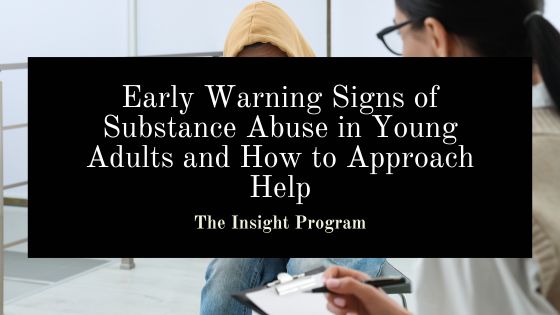Substance abuse is a serious concern, particularly for young adults navigating the challenges of growing independence, social pressures, and stress from school or work. Recognizing early warning signs of substance abuse can make a critical difference, helping families intervene before addiction takes a deeper hold. By knowing what to watch for and approaching the situation with care, families can provide support and guide their loved ones toward the help they need. Here are some key signs to look for and tips on how to offer assistance effectively.
Recognizing Early Warning Signs
1. Behavioral Changes
One of the earliest signs of substance abuse is a shift in behavior. This may include becoming increasingly secretive, withdrawing from family activities, or avoiding communication. You may notice sudden mood swings, irritability, or unexplained anger. While mood changes are common in young adults, when combined with secrecy or social withdrawal, they may signal a larger problem.
2. Decline in Academic or Work Performance
Substance use often affects cognitive function and motivation, leading to poor performance at school or work. A young adult struggling with substance abuse may start missing classes, skipping work, or seeing a drop in grades. This decline can be a red flag, especially if the young adult previously excelled or was highly engaged in their studies or job.
3. Changes in Physical Appearance
Substance abuse often affects physical appearance. Signs may include bloodshot eyes, frequent nosebleeds, unusual body odors, or changes in weight. These physical symptoms can vary depending on the substance but are generally noticeable if they occur alongside other behavioral signs. Lack of personal hygiene or a significant change in how they dress or groom themselves can also indicate that something is amiss.
4. Financial Irregularities
Many substances, especially illicit drugs, come with a financial cost. If a young adult begins asking for money frequently, shows sudden financial issues, or has unexplained expenses, it could be a sign of substance use. They may also start selling personal items or neglecting financial responsibilities.
5. Changes in Friend Groups
Substance abuse often leads young adults to gravitate toward others with similar habits, leading to changes in their social circle. If they start spending time with new friends who seem to encourage risky behavior or if they become reluctant to introduce these friends to family members, it may be cause for concern.
How to Approach Help
If you suspect that your loved one may be struggling with substance abuse, approaching them thoughtfully and compassionately is key. Here are some steps to guide the conversation:
1. Educate Yourself First
Learn about the substances you suspect may be involved and the typical signs of addiction. Understanding the issue better allows you to approach the conversation with facts and empathy, which is crucial in supporting your loved one without judgment.
2. Choose the Right Time and Place
Timing and setting are essential when addressing substance abuse. Choose a calm, private setting where the young adult feels safe. Avoid initiating the conversation when emotions are high, as this can lead to defensiveness or further withdrawal.
3. Express Concern, Not Accusation
Approach the conversation from a place of love and concern rather than accusation. Use “I” statements like, “I’ve noticed you seem stressed lately, and I’m worried,” instead of “You’re always hiding things,” which can come across as judgmental. Showing empathy can encourage open dialogue and reduce the young adult’s defensiveness.
4. Encourage Professional Help
If the young adult acknowledges their struggles, gently suggest seeking professional help. Reassure them that therapy, counseling, or support groups can provide non-judgmental guidance tailored to their needs. If they’re resistant, offer to research treatment options together or help them connect with a counselor.
5. Be Patient and Supportive
Recovery is a long process, and initial resistance is common. Respect their pace and maintain a supportive stance, even if they’re not immediately receptive. Let them know you’re there to help whenever they’re ready.
Early Intervention Matters
Recognizing and addressing early signs of substance abuse is one of the most impactful ways families can support young adults. By taking a compassionate, patient approach, families can help their loved ones seek assistance before substance abuse becomes addiction, ultimately setting them on a path to recovery and a brighter future.

